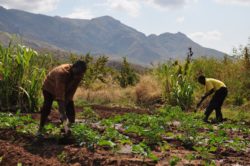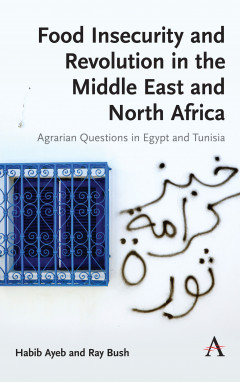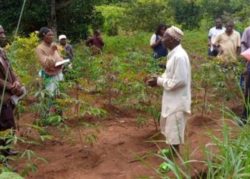Agricultural transformations
The political economy of agrarian transformations
We work with national governments and local communities to expose the political and economic nature of the agrarian transformations in Africa including the impact of land grabbing, the role agricultural cooperatives and the nature of food sovereignty as a development strategy. We document local resistance to agrarian transformations, including through film.
Land grabbing and local development
We work with national governments and local communities to explore and understand the impact of land grabbing on local development and rural livelihoods.
Simon Manda's work uses the Global Value Chain and the Sustainable Livelihood Approaches to explore and understand the extent to which large-scale agricultural investments impacts local development and rural livelihoods. Through the analytic lens of sugar value chains in Zambia, this mixed methods research integrates four interrelated elements: policy and institutional processes, value-chain inclusion and/or exclusion, sustainable livelihoods and agribusiness 'power of presence.'
Agricultural cooperatives
Agricultural cooperatives have seen a comeback in sub‐Saharan Africa. Based on empirical evidence from Uganda's coffee sector, Wiegratz and Wedig argue that donors' and African governments' renewed support is framed in largely apolitical terms, which obscures the contested political and economic nature of the revival.  In the context of neoliberal restructuring processes, state and non‐state institutional support to democratic economic organizations with substantial redistributional agendas remains insufficient. The political–economic context contributes to poor terms of trade for agricultural cooperatives while maintaining significant state control over some cooperative activities to protect the status quo interests of big capital and state elites.
In the context of neoliberal restructuring processes, state and non‐state institutional support to democratic economic organizations with substantial redistributional agendas remains insufficient. The political–economic context contributes to poor terms of trade for agricultural cooperatives while maintaining significant state control over some cooperative activities to protect the status quo interests of big capital and state elites.
Wedig & Wiegratz 2018
Agrarian change and peasant resistance
Ray Bush works on global political economy, food sovereignty in the context of imperialism and World Bank tropes of food security.  He documents peasant resistance to neo-liberal transformation in Africa and the Near East and he does so by exploring alternative development strategies to the mainstream development policy framing of the sustainable development goals and by working with an understanding of underdevelopment promoted by the capitalist world system.
He documents peasant resistance to neo-liberal transformation in Africa and the Near East and he does so by exploring alternative development strategies to the mainstream development policy framing of the sustainable development goals and by working with an understanding of underdevelopment promoted by the capitalist world system.
Agricultural sustainability and resilience to climate change
Our research provides more nuanced understandings of political and social context of agriculture and climate change. We contribute to a large interdisciplinary consortia GCRF-AFRICAP examining agricultural and rural transformation in Africa. Through this major programme we work with local organisations and governments to make agriculture and food production in Sub-Saharan Africa more productive, sustainable and resilient to climate change.
Building government capacity

Our researchers are part of GCRF-AFRICAP 'Agricultural and Food-system Resilience: Increasing Capacity and Advising Policy' working with local organisations and governments in Malawi, South Africa, Tanzania and Zambia. Our research interrogates the political and social context of climate resilience policy making to inform our initiatives to make agriculture and food production more productive, sustainable and resilient to climate change. Emma-Louise Anderson is contributing to creating an evidence base to underpin new country specific policies in agriculture and food production
Emma-Louise Anderson is collaborating with Laura Considine and Michael Chasukwa (Head of Politics and Administrative Studies, University of Malawi) to interrogate the multi-level, multifaceted power struggles that undergird the policy making and implementation process. Policy processes must not only be well-coordinated but also entail complex negotiations and prioritizations. This research explores the role of trust in strengthening collaboration on climate policy making.
GCRF-AFRICAPLocal perspectives and knowledge about climate change
Our research provides empirically-rich understandings of local perspectives and knowledge about climate change including work using participatory approaches.
Lata Narayanaswamy is working with Chris Patterson, University of Nairobi and the LSE on QR-GCRF ‘Information ecosystems, gender, indigenous knowledge and climate change adaptation’. This research explores how to provide nuanced understandings of how local information ecosystem in rural Kenyan communities operates and its effects on women's ability to combine indigenous and externally sourced knowledge in climate change adaptation.
Pierre Moorsom in his interdisciplinary PhD research project (supervised by Emma-Louise Anderson, Stephen Whitfield - Earth and Environment, and Tim Benton - Biology) sought to interrogate to what extent can participatory video contribute to reimagining development in Malawi. His research was designed to facilitate a genuine participatory process in which participants could take control reflect, deliberate, and holistically analyse their village’s social, agricultural and ecological realities, identifying problems and proposing solutions. Following semi-structured interviews he undertook a five month participatory video (PV) process that culminated in the film, ‘Tigwirane Manja - Holding Hands’.
It has been shared in screenings with the local community, development practitioners in Malawi and researchers in the UK. Funded by the Leeds Anniversary Research Scholarship (LARS).
